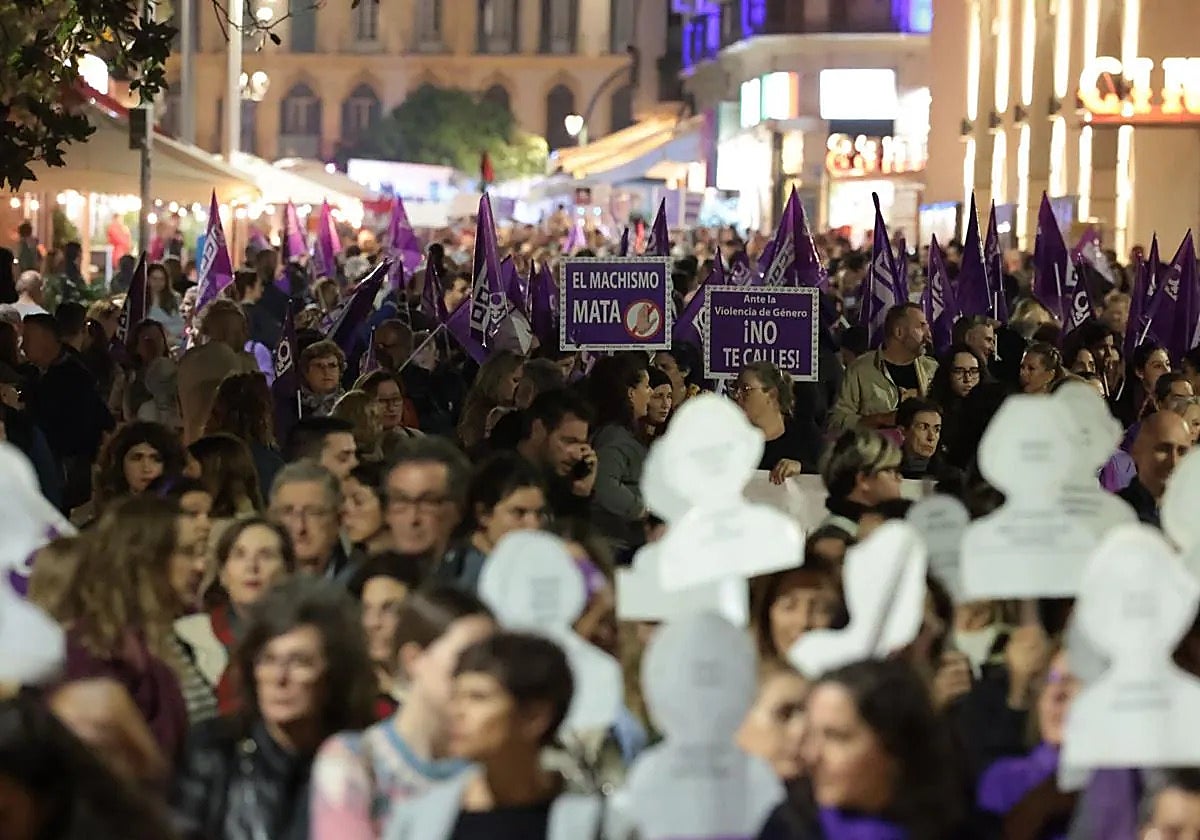Women take to the streets of Malaga city to protest against gender-based violence
Demonstrators demanded the law against domestic violence in Spain be updated to incorporate new threats that have emerged such as online abuse
Cristina Vallejo
Malaga
Tuesday, 26 November 2024, 10:32
Women have taken to the streets of Malaga city to protest against gender-based violence this Monday 25 November marking international day for the elimination of violence against women. Demonstrators filled the streets to denounce the cases of five Malaga women murdered because of gender-based violence, the dozen crimes committed throughout Andalucía and the more than 40 murders that have occurred in Spain this year.
In the march which started at Plaza de la Merced at 7.30pm on Monday, demonstrators demanded the renewal of Spain's comprehensive law against gender violence which the country passed in 2004. Andrea Barbotta, a prominent member of the Malaga movement for equality and vice-president of the Andalusian Council for Women's Participation said it was a milestone in Spain at the time, and set an example for other European countries.
"We tend to make a negative balance of what has happened in these last 20 years, but before the turning point marked by the murder of Ana Orantes - it was the testimony of that victim that motivated a global awareness - there was nothing, there was no legal framework to protect women," she said.
Another demonstrator, Rosa, 69, said: "Now you can refer a victim to institutions or people who can help her; not before". Meanwhile, Silvia, 32, carried a disheartening banner which read: "There is not a single day that we are safe".
Barbotta pointed out that taking to the streets is useful, even though it may not seem so as gender-based murders continue: "It's not that there are more cases now, it's that more are identified and we learn to recognise the violence we suffer."
'Strong and united'
Alba García, from feminist platform Libres y Combativas (Free and Combative), said the movement for the right to housing or the pro-Palestine demonstrations contributed to Monday's unity in the streets and pointed out that it was a forum for multiple issues to be called out. She pointed out one protester who had attended last night's demonstration to defend her daughter, protesting for gender self-determination that includes the trans law.
"I see the feminist movement in Malaga, despite the offensive and patriarchal reaction, strong and united," said Carmen Martín, president of the Zero Violence platform. "The struggle in the street is the only way to continue advancing. If we stop, we go backwards," García pointed out.
"Gender violence is something real, palpable; we see it in Spain, with the number of women murdered, two every two weeks; in Latin America, with two every day; and in France, with the case of Dominique Pélicot - the woman who suffered multiple rapes by her husband," she added.
Old and new reasons
Demonstrators also called out more subtle expressions of abuse, such as psychological, economic, sexual, institutional and online abuse. The Junta's delegate of equality Ruth Sarabia said there is a good reason why violence against women is an issue that remains in the heart of the most informed generation in history, while the Socialists pointed out that 85% of victims of sexual cyber-violence are girls under 13 years of age.
These are the reasons that continue to bring women out onto the streets. "There are aspects of the comprehensive law that are still not being complied with, as the council of Europe has highlighted, which has demanded a few days ago that family judges receive mandatory training in gender violence in Spain," Barbotta added.
The vice-president of the Andalusian Council for Women's Participation pointed out it is crucial to avoid re-victimising women. What is labeled as "institutional violence" has led to phenomena such as the one that occurred around the case of Íñigo Errejón, the left-wing Spanish politician who resigned from politics last month following an allegation of sexual assault.
Zero Violence president Carmen Martín said demonstrators wanted to see Spain's law against gender-based violence complied to in its entirety, such as employment plans and subsidised hiring so women victims can regain an independent life. She also said the law should be updated to incorporate new forms of violence that have emerged, such as via social media.
